GALLUP NEWS SERVICE
PRINCETON, NJ -- Adding to such longtime energy concerns as finite global oil supplies and U.S. dependence on foreign oil, the massive electrical outage that struck parts of the United States and Canada last August gave Americans a new energy problem to worry about: the fitness of the country's electrical power system. Today, the high cost of energy, including high gas-pump and home heating oil prices for consumers, is a major issue for the U.S. economy.
Despite this, the findings of Gallup's annual Environment survey, conducted March 8-11, suggest that energy may be the kind of issue that doesn't trouble average Americans until the situation becomes critical. At least, memories tend to be short. Today, only 29% of Americans say the energy situation in the United States is very serious, similar to the 28% recorded last March. This contrasts with 58% in 2001, during the height of the West Coast energy shortage, 40% during the 1991 Gulf War, and 47% during the 1979 energy crisis.
| Seriousness of U.S. Energy Situation Selected Trend |
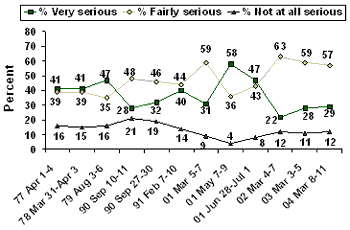 |
Also, energy ranks below several other domestic issues in the degree to which Americans worry about it today. Only 35% worry "a great deal" about the availability and affordability of energy in the United States. This is much lower than the percentage saying they are highly worried about healthcare (62%) and crime (46%), and somewhat lower than concern about other issues, including terrorism and the economy.
Public concern about energy has increased slightly over the past year, but is below the 46% rating seen three years ago.
| Availability and Affordability of
Energy percentage worried "a great deal" |
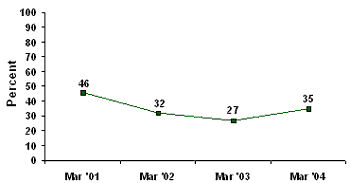 |
The percentage of Americans saying the United States will face a critical energy shortage in the next five years has fluctuated since 2001, seemingly in response to various domestic and international events. Six in 10 believed this was possible in 2001, during the time the West Coast was experiencing its energy crisis. And after dropping to 48% the following year, it spiked again just prior to the start of the 2003 Iraq war. But current concern is once again below 50%. Just 49% now foresee a critical energy shortage in the near term.
| Do you think that the United States is or is not likely to face a critical energy shortage during the next five years? |
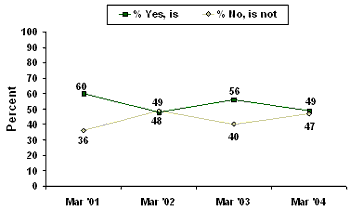 |
Bush's Energy Policy Rating Declines
A natural question in this election year is how the energy issue will play out politically. Although energy appears to be less salient to Americans than it was in 2001 or 2002, public criticism of President Bush's performance on the energy issue may give his Democratic opponent, Massachusetts Sen. John Kerry, an opportunity to use the issue to his advantage.
Bush's rating on energy policy has steadily declined since the start of his term, to the point that a majority (51%) now say he is doing a poor job on the issue. Two years ago, a plurality of Americans felt he was doing a good job. And three years ago, at the start of his term, a solid majority expected that he would do a good job.
It is important to note that the March and April 2001 ratings of Bush on this dimension were taken at a time (pre-9/11) when his overall job approval ratings were just slightly higher than they are today. This suggests that the long-term decline in his energy ratings may indeed reflect public reaction to his energy policies, and not just to his administration as a whole.
| Ratings of President George W. Bush |
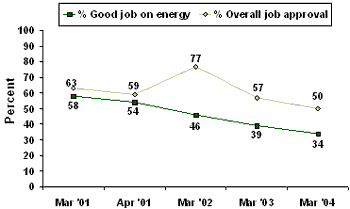 |
The Energy/Environment Tradeoff
If energy does become a campaign issue, the candidates would do well to remember that Americans express a slightly greater interest in protecting the environment than they do in seeing U.S. energy supplies developed. In past surveys, there was an even larger margin coming down on the side of the environment. This could explain why in previous ���۴�ýEnvironment surveys, a majority of Americans have consistently opposed opening up the Alaskan wilderness for oil exploration.
| Which Should Be Given Priority - Protection of the Environment or Development of U.S. Energy Supplies? |
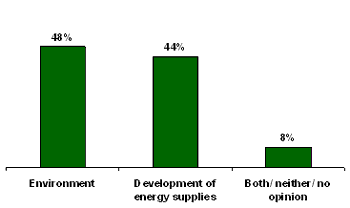 |
| March 8-11, 2004 |
Opinions on this are partisan. By a more than two-to-one margin (63% vs. 30%), Republicans believe that development of energy supplies should be given priority over environmental protection. Democrats take the opposite tack; 61% say environmental protection should be the priority, while only 33% favor energy production.
There is also a strong age skew on the issue. Young adults (aged 18-29) tend to favor protecting the environment, while middle-aged adults (30-64) are divided in their preferences for the two goals and seniors (65+) favor energy production.
More generally, when asked which of two approaches the United States should use to solve the nation's current energy problems -- more production of oil, gas, and coal supplies or more conservation by consumers of existing supplies -- Americans choose conservation over production, by 59% to 31%.
Which of the following approaches to solving the nation's energy problems do you think the U.S. should follow right now – [ROTATED: emphasize production of more oil, gas and coal supplies (or) emphasize more conservation by consumers of existing energy supplies]?
|
|
|
BOTH/ EQUALLY (vol.) |
NEITHER/ OTHER (vol.) |
|
|
|
% |
% |
% |
% |
% |
|
|
2004 Mar 8-11 |
31 |
59 |
6 |
2 |
2 |
|
2003 Mar 3-5 |
29 |
60 |
7 |
2 |
2 |
|
2002 Mar 4-7 |
30 |
60 |
6 |
2 |
2 |
|
2001 May 7-9 |
35 |
47 |
14 |
2 |
2 |
|
2001 Mar 5-7 |
33 |
56 |
8 |
1 |
2 |
|
(vol.) Volunteered response |
|||||
Partisan and age differences on this question are less pronounced than on the energy/environment tradeoff.
Bottom Line
Mariesa Crow, an electrical engineer at the University of Missouri-Rolla, was quoted last fall on NewScientist.com as saying that the ultimate cause of last year's power outage is an aging transmission system that can't keep up with growing demand: "I think we are going to see widespread blackouts until we build a bigger system."
New Yorkers and others who went more than 24 hours without electricity and running water last summer got a sense of how dependent Americans are on these basic utilities. The same might be said of Californians who endured rolling power blackouts three years ago. U.S. gas prices have increased significantly already this year, and industry observers predict that pump prices could reach record highs this summer. Clearly, there are many reasons why Americans should be concerned about energy, or at least could become more concerned in the future. But at the moment, it is not an issue they are worrying much about.
Survey Methods
These results are based on telephone interviews with a randomly selected national sample of 1,005 adults, aged 18 years and older, conducted March 8-11, 2004. For results based on this sample, one can say with 95% confidence that the maximum error attributable to sampling and other random effects is ±3 percentage points. In addition to sampling error, question wording and practical difficulties in conducting surveys can introduce error or bias into the findings of public opinion polls.
11. Next I'm going to read a list of problems facing the country. For each one, please tell me if you personally worry about this problem a great deal, a fair amount, only a little, or not at all? First, how much do you personally worry about – [RANDOM ORDER]?
H. The availability and affordability of energy
|
Great |
Fair |
Only a |
Not |
No |
|
|
% |
% |
% |
% |
% |
|
|
2004 Mar 8-11 |
35 |
28 |
25 |
11 |
1 |
|
2003 Mar 24-25 |
27 |
36 |
25 |
11 |
1 |
|
2002 Mar 4-7 |
32 |
30 |
29 |
9 |
* |
|
2001 Mar 5-7 |
46 |
31 |
16 |
6 |
1 |
|
* Less than 0.5% |
|||||
12. Do you think George W. Bush is doing a good job or a poor job in handling each of the following issues as president? How about – [RANDOM ORDER]?
B. Improving the nation's energy policy
|
|
|
FAIR/MIXED (vol.) |
|
||
|
% |
% |
% |
% |
||
|
2004 Mar 8-11 |
34 |
51 |
8 |
7 |
|
|
2003 Mar 3-5 |
39 |
45 |
7 |
9 |
|
|
2002 Mar 4-7 |
46 |
36 |
8 |
10 |
|
|
2001 Apr 6-9 ^ |
54 |
36 |
3 |
7 |
|
|
2001 Mar 5-7 ^ |
58 |
29 |
6 |
7 |
|
|
^ |
Do you think George W. Bush will do a good job or a poor job in handling each of the following issues as president? How about – [RANDOM ORDER]? |
||||
|
(vol.) Volunteered response |
|||||
19. With which one of these statements about the environment and energy production do you most agree – [ROTATED: protection of the environment should be given priority, even at the risk of limiting the amount of energy supplies -- such as oil, gas and coal -- which the United States produces (or) development of U.S. energy supplies -- such as oil, gas and coal -- should be given priority, even if the environment suffers to some extent]?
|
|
Develop- |
|
|
|
|
|
% |
% |
% |
% |
% |
|
|
2004 Mar 8-11 |
48 |
44 |
3 |
1 |
4 |
|
2003 Mar 3-5 |
49 |
40 |
5 |
2 |
4 |
|
2002 Mar 4-7 |
52 |
40 |
3 |
2 |
3 |
|
2001 Mar 5-7 |
52 |
36 |
6 |
2 |
4 |
|
(vol.) Volunteered response |
|||||
21. How serious would you say the energy situation is in the United States--very serious, fairly serious, or not at all serious?
|
Very |
Fairly |
Not at all |
No |
|
|
% |
% |
% |
% |
|
|
2004 Mar 8-11 |
29 |
57 |
12 |
2 |
|
2003 Mar 3-5 |
28 |
59 |
11 |
2 |
|
2002 Mar 4-7 |
22 |
63 |
12 |
3 |
|
2001 Jun 28-Jul 1 |
47 |
43 |
8 |
2 |
|
2001 May 7-9 |
58 |
36 |
4 |
2 |
|
2001 Mar 5-7 |
31 |
59 |
9 |
1 |
|
1991 Feb 7-10 |
40 |
44 |
14 |
2 |
|
1990 Sep 27-30 |
32 |
46 |
19 |
3 |
|
1990 Sep 10-11 |
28 |
48 |
21 |
3 |
|
1990 Aug 9-12 |
28 |
45 |
23 |
4 |
|
1979 Aug 3-6 |
47 |
35 |
16 |
3 |
|
1979 Jun 1-4 |
37 |
36 |
24 |
3 |
|
1979 Apr 27-May 4 |
44 |
36 |
16 |
4 |
|
1979 Feb 23-26 |
43 |
42 |
13 |
2 |
|
1978 Mar 31-Apr 3 |
41 |
39 |
15 |
5 |
|
1977 Nov 18-21 |
40 |
42 |
14 |
4 |
|
1977 Sep 30-Oct 3 |
40 |
40 |
16 |
4 |
|
1977 Aug 5-8 |
38 |
43 |
13 |
6 |
|
1977 Jun 3-6 |
40 |
42 |
13 |
5 |
|
1977 Apr 29-May 2 |
44 |
40 |
11 |
5 |
|
1977 Apr 1-4 |
41 |
39 |
16 |
4 |
22. Which of the following approaches to solving the nation's energy problems do you think the U.S. should follow right now -- [ROTATED: emphasize production of more oil, gas and coal supplies (or) emphasize more conservation by consumers of existing energy supplies]?
|
|
|
BOTH/ EQUALLY (vol.) |
NEITHER/ OTHER |
|
|
|
% |
% |
% |
% |
% |
|
|
2004 Mar 8-11 |
31 |
59 |
6 |
2 |
2 |
|
2003 Mar 3-5 |
29 |
60 |
7 |
2 |
2 |
|
2002 Mar 4-7 |
30 |
60 |
6 |
2 |
2 |
|
2001 May 7-9 |
35 |
47 |
14 |
2 |
2 |
|
2001 Mar 5-7 |
33 |
56 |
8 |
1 |
2 |
|
(vol.) Volunteered response |
|||||
23. Do you think that the United States is or is not likely to face a critical energy shortage during the next five years?
|
|
|
ALREADY FACING ONE (vol.) |
No |
|
|
% |
% |
% |
% |
|
|
2004 Mar 8-11 |
49 |
47 |
1 |
3 |
|
2003 Mar 3-5 |
56 |
40 |
1 |
3 |
|
2002 Mar 4-7 |
48 |
49 |
1 |
2 |
|
2001 Mar 5-7 |
60 |
36 |
1 |
3 |
|
1978 Nov 10-13 |
45 |
41 |
4 |
10 |
|
(vol.) Volunteered response |
||||
